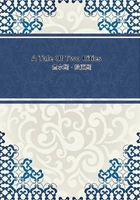
第88章 BOOK THE THIRD:THE TRACK OF A STORM(3)
‘I entreat you to observe that I have come here voluntarily,in response to that written appeal of a fellow countryman which lies before you. I demand no more than the opportunity to do so without delay.Is not that my right?’
‘Emigrants have no rights,Evremonde,’was the stolid reply. The officer wrote until he had finished,read over to himself what he had written,sanded it,and handed it to Defarge,with the words,‘In secret.’
Defarge motioned with the paper to the prisoner that he must accompany him. The prisoner obeyed,and a guard of two armed patriots attended them.
‘Is it you,’said Defarge,in a low voice,as they went down the guardhouse steps and turned into Paris,‘who married thedaughter of Doctor Manette,once a prisoner in the Bastille that is no more?’
‘Yes,’replied Darnay,looking at him with surprise.
‘My name is Defarge,and I keep a wine-shop in the Quarter Saint Antoine. Possibly you have heard of me.’
‘My wife came to your house to reclaim her father?Yes!’
The word‘wife'seemed to serve as a gloomy reminder to Defarge,to say with sudden impatience,‘In the name of that sharp female newly-born,and called La Guillotine,why did you come to France?’
‘You heard me say why,a minute ago. Do you not believe it is the truth?’
‘A bad truth for you,’said Defarge,speaking with knitted brows,and looking straight before him.
‘Indeed I am lost here. All here is so unprecedented,so changed,so sudden and unfair,that I am absolutely lost.Will you render me a little help?’
‘None.’Defarge spoke,always looking straight before him.
‘Will you answer me a single question?’
‘Perhaps. According to its nature.You can say what it is.’
‘In this prison that I am going to so unjustly,shall I have some free communication with the world outside?’
‘You will see.’
‘I am not to be buried there,prejudiced,and without any means of presenting my case?’
‘You will see. But,what then?Other people have been similarly buried in worse prisons,before now.’
‘But never by me,Citizen Defarge.’
Defarge glanced darkly at him for answer,and walked on in asteady and set silence. The deeper he sank into this silence,the fainter hope there was—or so Darnay thought—of his softening in any slight degree.He,therefore,made haste to say:
‘It is of the utmost importance to me(you know,Citizen,even better than I do,of how much importance),that I should be able to communicate to Mr. Lorry of Tellson's Bank,an English gentleman who is now in Paris,the simple fact without comment,that I have been thrown into the prison of La Force.Will you cause that to be done for me?’
‘I will do,’Defarge doggedly rejoined,‘nothing for you. My duty is to my country and the People.I am the sworn servant of both,against you.I will do nothing for you.’
Charles Darnay felt it hopeless to entreat him further,and his pride was touched besides. As they walked on in silence,he could not but see how used the people were to the spectacle of prisoners passing along the streets.The very children scarcely noticed him.A few passers turned their heads,and a few shook their fingers at him as an aristocrat;otherwise that a man in good clothes should be going to prison,was no more remarkable than that a labourer in working clothes should be going to work.In one narrow,dark,and dirty street through which they passed,an excited orator,mounted on a stool,was addressing an excited audience on the crimes against the people,of the king and the royal family.The few words that he caught from this man's lips,first made it known to Charles Darnay that the king was in prison,and that the foreign ambassadors had one and all left Paris.On the road(except at Beauvais)he had heard absolutely nothing.The escort and the universal watchfulness had completely isolated him.
That he had fallen among far greater dangers than those whichhad developed themselves when he left England,he of course knew now. That perils had thickened about him fast,and might thicken faster and faster yet,he of course knew now.He could not but admit to himself that he might not have made this journey,if he could have foreseen the events of a few days.And yet his misgivings were not so dark as,imagined by the light of this later time,they would appear.Troubled as the future was,it was the unknown future,and in its obscurity there was ignorant hope.The horrible massacre,days and nights long,which,within a few rounds of the clock,was to set a great mark of blood upon the blessed garnering time of harvest,was as far out of his knowledge as if it had been a hundred thousand years away.The‘sharp female newly-born,and called La Guillotine,'was hardly known to him,or to the generality of people,by name.The frightful deeds that were to be soon done,were probably unimagined at that time in the brains of the doers.How could they have a place in the shadowy conceptions of a gentle mind?
Of unjust treatment in detention and hardship,and in cruel separation from his wife and child,he foreshadowed the likelihood,or the certainty;but,beyond this,he dreaded nothing distinctly. With this on his mind,which was enough to carry him into a dreary prison courtyard,he arrived at the prison of La Force.
A man with a bloated face opened the strong wicket,to whom Defarge presented‘The Emigrant Evremonde.’
‘What the Devil!How many more of them!’exclaimed the man with the bloated face.
Defarge took his receipt without noticing the exclamation,and withdrew,with his two fellow-patriots.
‘What the Devil,I say again!’exclaimed the gaoler,left with his wife.‘How many more!’
The gaoler's wife,being provided with no answer to the question,merely replied,‘One must have patience,my dear!’Three turnkeys who entered responsive to a bell she rang,echoed the sentiment,and one added,‘For the love of Liberty’;which sounded in that place like an inappropriate conclusion.